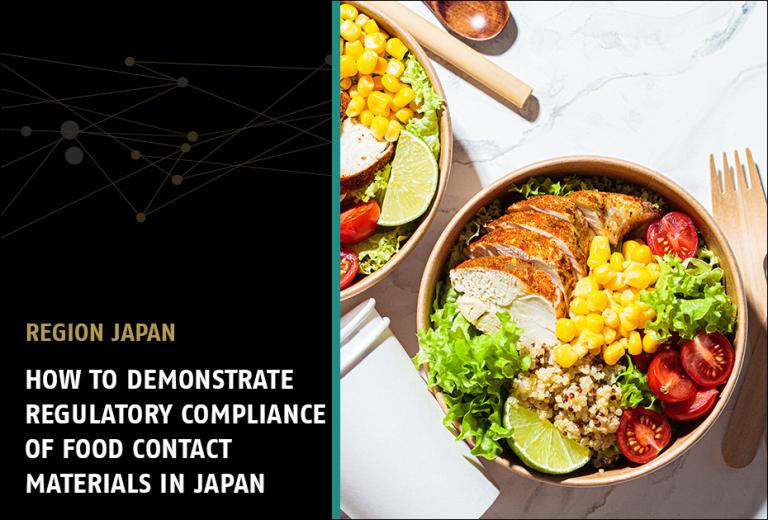How to demonstrate regulatory compliance of Food Contact Materials
In Japan, food contact materials (FCM) include these categories: utensils, containers and packaging (UCPs). The two basic laws / regulations governing the UCPs are the Food Sanitation Act[1] (Act No. 233 of 24 December 1947) and the Food Safety Basic Act[2] (Act No. 48 of 23 May, 2003).
The Food Sanitation Act was first published in 1947 and has been revised several times. It sets out the detailed regulations on food and food additives, UCPs, label and advertising requirements, monitoring and guidance, etc. The Act on Partial Amendment of the Food Sanitation Act, promulgated on 13 June 2018, introduced a national Positive List (PL) system for UCPs, whereby only substances that have been assessed for safety can be used in making UCPs for the Japanese market. This new requirement has entered into force on 1 June 2020, while the latest draft version, under consultation, is dated 6th March 2023.[3]
All food contact substances that are used for making UCPs for the Japanese market will be listed in these national PLs during a 5-year transition period until 31 May 2025. To be noted that currently the PLs include the polymeric resins and the corresponding starting substances (i.e., monomers, and other starting substances) as well as the food contact additives allowed to be used in making plastic UCPs and specific coated UCPs, while the PLs for paper and paper board, for printing inks intended to be used in food contact applications, for metallic UCPs and many other PLs still need to be developed by the Ministry of Health, Labour and Welfare (MHLW) of Japan. From 1 June 2025, the food contact substances (polymeric resins and the corresponding starting substances) that are not on these PLs may not be used in making UCPs for the Japanese market. It is highly important to note that even during the 5-year transition period, UCPs’ compliance information must be communicated/provided throughout the supply chain stating that the UCPs meet the requirements of the PL system.
It is therefore important to confirm that the UCPs meet the requirements of the positive list. In addition to a form of self-compliance check / confirmation carried out by the company itself, the companies are allowed to apply for obtaining a "Certificate of Compliance/ Conformity (CoC)" on UCPs with the Japan Institute for Chemical Research and Evaluation (JCII). [4]
What is JCII and its role?
The Japan Institute for Chemical Research and Evaluation (JCII) has been working as a preparatory committee for the promotion of the new FCM management system in Japan, and was newly established as the FCM Safety Center[5] on 1 June 2020. This Centre is the result of the merger of the well-known Hygienic Olefin and Styrene Plastics Association (JHOSPA), the Japan Hygienic Committee for PVC (JHPA) and the Japan Hygienic Committee for Vinyl Chloride (JHAVDC).
This FCM Safety Center acts as a link between the industry / specific organizations and the relevant Japanese governmental agencies to ensure that current business activities in the FCM supply chain can continue smoothly and be in compliance with the revised Food Sanitation Act.
This FCM Safety Centre has a membership system and provides various information to its members. There are currently two different types of membership:
1) Regular Member:
- Those engaged in the manufacture, sale, etc. of raw materials used in making UCPs;
- Those engaged in the manufacture, processing, sale, etc. of UCPs;
- Those engaged in the manufacture, processing, sale, etc. of food products using UCPs.
2) Associate Member:
- Industry organization(s), related to the safety and sanitation of UCPs, etc.
Such a membership with JCII provides a number of membership benefits, including:
- Can apply for a compliance check with the national Positive List under the Amended Food Sanitation Act of Japan and also request JCII to issue a Certificate of Compliance/ Conformity (CoC) to a member company;
- Can submit opinions and/or make direct enquires to Governmental organization;
- Can receive regulatory information and/or instructions in a timely manner related to the national Positive List System;
- Can obtain various types of information and materials related to the national Positive List system through the Member Account of JCII;
- Can participate preferentially in seminars or events held by JCII;
- Can receive consultation about the national Positive List System, and/ or on the UCPs’ supply chain management in general, etc.;
- Can receive consultation and/or assistance on the application for a new food contact substance registration/ authorization to the national Positive List under the Act.
Membership is open to all nationalities as long as they meet the membership requirements set out by the JCII. However, the companies located outside of Japan must have an agent or a branch office (such an ‘Only Representative’) located in Japan and that the language of processing and communication can only be Japanese. Such a local agent or a branch office shall be responsible for the application for the JCII’s membership and all other related tasks mentioned above.
What can knoell do for you?
- Regulatory and technical support on UCPs intended to be placed on the Japanese market;
- Pre-consultation advice on the application to JCII for a Certificate of Compliance (CoC);
- Pre-consultation on the application to JCII for an ‘Opinion letter’;
- Application support, including dossier preparation and submission for new food contact substances to be added to the national PL system depending on the requirements to be decided by the authority in the later stages;
- Can act as such an “Only Representative” representing companies to receive JCII services including:
Membership application and payment of the annual membership fee;
CoC application strategy;
Dossier preparation and submission for CoC
Pre- & post-communication with JCII linked to an application;
Provide updates on the JCII membership and related certificates;
Overall JCII’s account management.
[1] Food Sanitation Act of Japan: https://www.japaneselawtranslation.go.jp/ja/laws/view/3687
[2] Food Safety Basic Act: https://www.japaneselawtranslation.go.jp/ja/laws/view/3757
[3] National Positive Lists (in Japanese): https://www.mhlw.go.jp/stf/newpage_25201.html
[4] JCII official website: https://www.jcii.or.jp/
[5] Food Contact Materials Safety Center: https://www.jcii.or.jp/pages/65/


